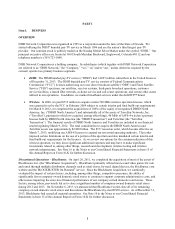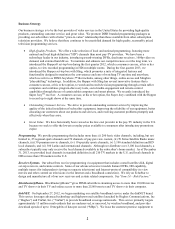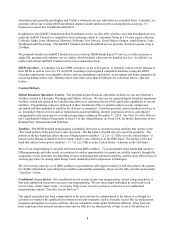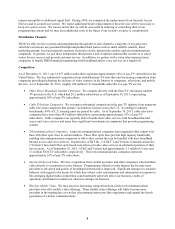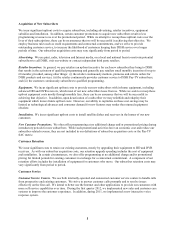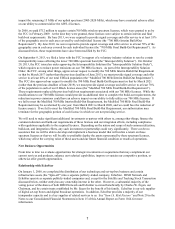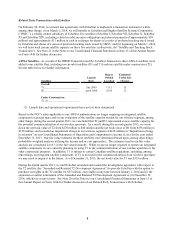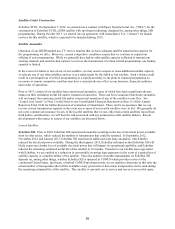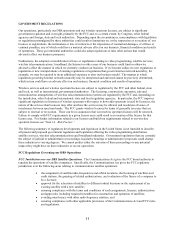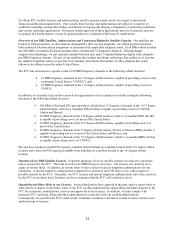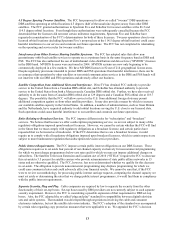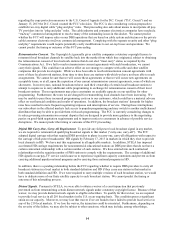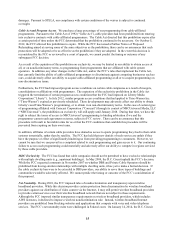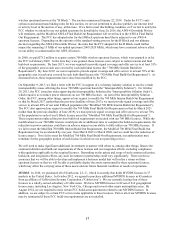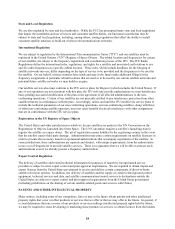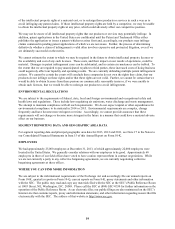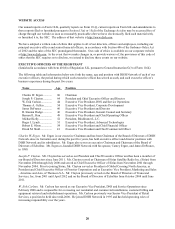Dish Network 2013 Annual Report Download - page 21
Download and view the complete annual report
Please find page 21 of the 2013 Dish Network annual report below. You can navigate through the pages in the report by either clicking on the pages listed below, or by using the keyword search tool below to find specific information within the annual report.11
11
GOVERNMENT REGULATIONS
Our operations, particularly our DBS operations and our wireless spectrum licenses, are subject to significant
government regulation and oversight, primarily by the FCC and, to a certain extent, by Congress, other federal
agencies and foreign, state and local authorities. Depending upon the circumstances, noncompliance with legislation
or regulations promulgated by these authorities could result in limitations on, or the suspension or revocation of, our
licenses or registrations, the termination or loss of contracts or the imposition of contractual damages, civil fines or
criminal penalties, any of which could have a material adverse effect on our business, financial condition and results
of operations. These governmental authorities could also adopt regulations or take other actions that would
adversely affect our business prospects.
Furthermore, the adoption or modification of laws or regulations relating to video programming, satellite services,
wireless telecommunications, broadband, the Internet or other areas of our business could limit or otherwise
adversely affect the manner in which we currently conduct our business. If we become subject to new regulations or
legislation or new interpretations of existing regulations or legislation that govern Internet network neutrality, for
example, we may be required to incur additional expenses or alter our business model. The manner in which
legislation governing Internet network neutrality may be interpreted and enforced cannot be precisely determined,
which in turn could have an adverse effect on our business, financial condition and results of operations.
Wireless services and our wireless spectrum licenses are subject to regulation by the FCC and other federal, state
and local, as well as international, governmental authorities. The licensing, construction, operation, sale and
interconnection arrangements of wireless telecommunications systems are regulated by the FCC and, depending on
the jurisdiction, other federal and international, state and local regulatory agencies. In particular, the FCC imposes
significant regulation on licensees of wireless spectrum with respect to how radio spectrum is used by licensees, the
nature of the services that licensees may offer and how the services may be offered, and resolution of issues of
interference between spectrum bands. The FCC grants wireless licenses for terms of generally ten years that are
subject to renewal or revocation. There can be no assurances that our wireless spectrum licenses will be renewed.
Failure to comply with FCC requirements in a given license area could result in revocation of the license for that
license area. For further information related to our licenses and build-out requirements related to our wireless
spectrum licenses see “Item 1A. Risk Factors.”
The following summary of regulatory developments and legislation in the United States is not intended to describe
all present and proposed government regulation and legislation affecting the video programming distribution,
satellite services, wireless telecommunications and broadband industries. Government regulations that are currently
the subject of judicial or administrative proceedings, legislative hearings or administrative proposals could change
these industries to varying degrees. We cannot predict either the outcome of these proceedings or any potential
impact they might have on these industries or on our operations.
FCC Regulations Governing our DBS Operations
FCC Jurisdiction over our DBS Satellite Operations. The Communications Act gives the FCC broad authority to
regulate the operations of satellite companies. Specifically, the Communications Act gives the FCC regulatory
jurisdiction over the following areas relating to communications satellite operations:
x the assignment of satellite radio frequencies and orbital locations, the licensing of satellites and
earth stations, the granting of related authorizations, and evaluation of the fitness of a company to
be a licensee;
x approval for the relocation of satellites to different orbital locations or the replacement of an
existing satellite with a new satellite;
x ensuring compliance with the terms and conditions of such assignments, licenses, authorizations
and approvals; including required timetables for construction and operation of satellites;
x avoiding interference with other radio frequency emitters; and
x ensuring compliance with other applicable provisions of the Communications Act and FCC rules
and regulations.


